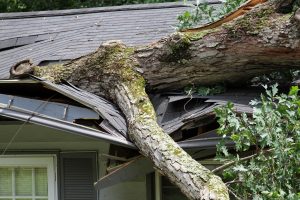Why You Should Have Homeowners and Renters Insurance
Aug 28, 2024In life, they say two things are guaranteed: death and taxes. Let’s add to that – unexpected housing expenses. It’s no secret that being a homeowner comes with added responsibility, including mortgage loans, home maintenance, and being prepared for anything. It’s not enough to have money saved away in a high-yield savings account for a rainy day. Homeowners or Renters insurance is the only way to ensure that your home and personal belongings are covered in case of a disaster.
What is Homeowners Insurance?
Homeowners insurance is specifically for people who own their own home or apartment. It covers personal belongings and the home’s structure. The only difference between homeowner and renter insurance is that homeowners’ insurance covers the dwelling.
There are five core coverages in homeowners’ insurance:
- Dwelling: the actual home structure
- Personal Property: personal items stored within the home
- Personal Liability: covers bodily injury and property damage sustained by others
- Additional Living Expenses: the excess cost of living fees you incur from being displaced from your home
- Medical Payments: pays the medical bills of people who are accidentally hurt on your property – not including members of your household
What does Homeowners Insurance cover?
- Fire
- Smoke
- Windstorm
- Hail
- Lightening
- Explosions
- Vehicles
- Civil Unrest or Riots
- Theft
- Vandalism or malicious mischief
- Trees and other falling objects
- Weight of ice, snow, and sleet
- Water damage resulting from freezing, rupturing, or Vehicles sudden and accidental overflow of plumbing, heating air conditioning, the fire sprinkler system, or a household appliance

What is not covered under Homeowners Insurance?
- Government seizure, demolition, or requirement to rebuild to match building codes
- Floods
- Earth movements, including earthquakes, sinkholes and landslides
- Power failure (if the source is off residence)
- Homeowner neglect
- War and nuclear hazards
In addition to making sound financial sense, homeowners insurance offers peace of mind for you and your family. With severe weather becoming more prevalent daily, we don’t foresee homeowners insurance becoming an optional addon to home ownership. It will become an absolute must-have.
What is Renter’s Insurance?
Renters Insurance is a policy you can get when you rent a unit and do not own the dwelling. A renter’s insurance policy covers everything but the home itself. It protects you financially against insured damage or loss to furniture, clothing and other personal property inside your rental home. In addition to personal items, it can also cover personal liability, additional living expenses, and medical payments.
The Cost of Homeowners Insurance vs. Renters Insurance
By nature, renter’s insurance is much more affordable than homeowner’s insurance. This is because home policies cover everything renter’s insurance does, plus the cost of repairing the home’s structure. The average annual cost of a homeowner’s insurance policy is $2,377 nationwide, while the average price of renter’s insurance is $173. Many insurance companies will give you deals if you package your car insurance with your homeowner’s or renters’ insurance, which they call “bundling”.

How to Find the Best Deal on Insurance
Research is required to find the right insurance company and policy for you, depending on where you live and your current situation. Are you married, have children, retired, etc.? These are all things to consider, as well as whether you live within the rules of an HOA. It’s always best to do online research and contact a local insurance agent for assistance. Look for discounts for military members, teachers, students, etc., to help offset some of the cost.
Some things you can do to prepare to shop would be to know the value of your property ahead of time. Coverage is typically selected based on the levels offered and where your situation and/or property falls within those levels. Your dwelling coverage should meet or exceed the replacement cost of your home. With renter’s insurance, your personal property coverage should be high enough to cover the value of what you own in the event of a total loss. Take a complete inventory of your belongings, including pictures of big-ticket items like televisions, furniture, and electronic equipment. Your agent will be able to best direct you, based on the total cost estimate, to what policy coverage is right for you.
Whatever you choose to do, make sure it includes purchasing the plan and auto-paying it every month, so you don’t miss a payment. You must keep your policy current, up-to-date, and paid on time. And remember to revisit your policy every year to make changes when necessary. You must update your policy if you get married, buy a home, divorce, or have a child. Your insurance policy should be treated like spring home maintenance.
As we expect to look toward a future of more hurricanes, tornados, and wildfires, it will be up to each of us to be prepared in the best way we can. Don’t be left out in the cold with a lifetime of memories lost because you wanted to save a few dollars. Spend time and money on critical things, like peace of mind for you and your family. The best gift you can give yourself is a safety net.
Back To Blog

Recent Comments